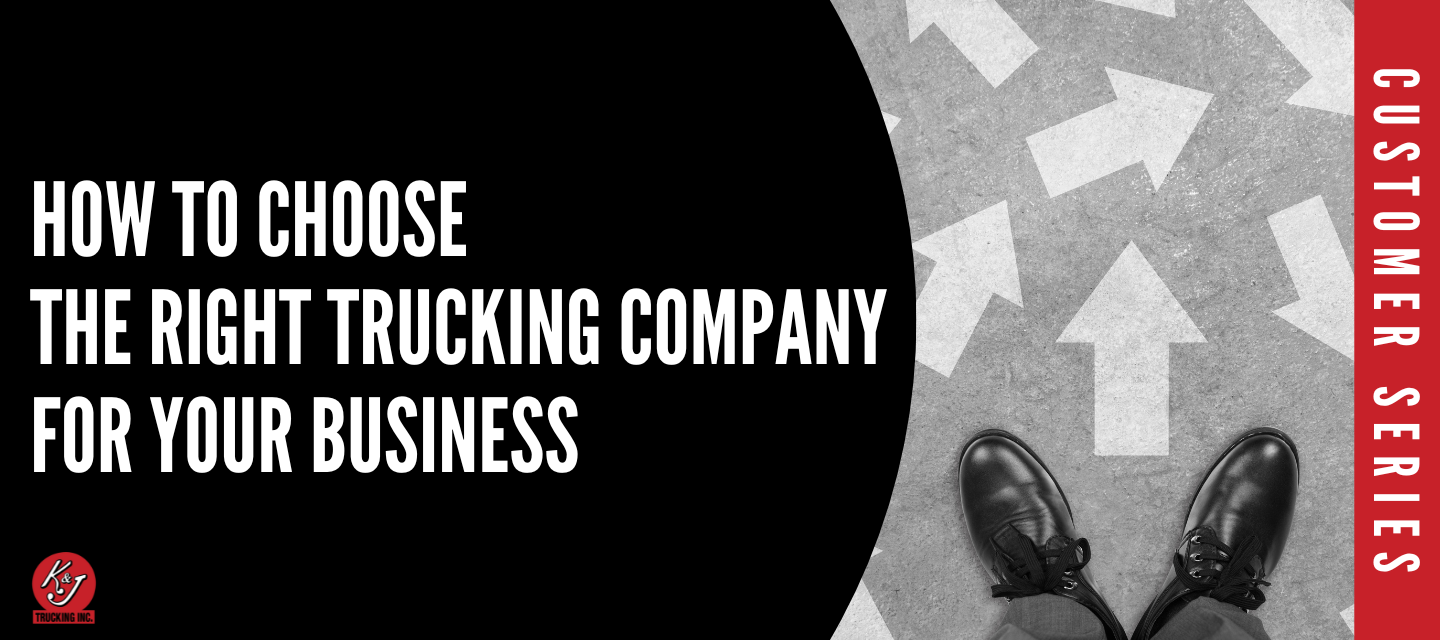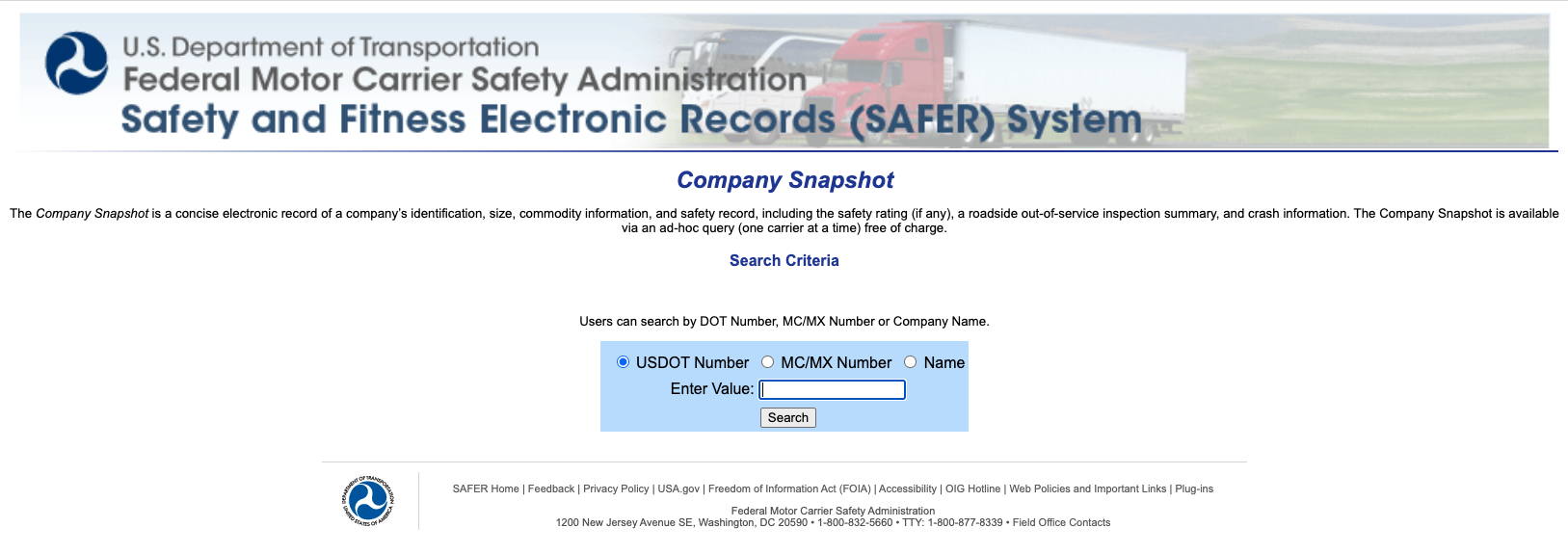How to Choose the Right Trucking Company for Your Business

Embarking on the adventure of shipping stuff around? Awesome! At K&J we've been shipping stuff around by truck for over 40 years! And as an award-winning trucking carrier, we have some advice for businesses delving into the freight world. This guide is your map to the exciting world of moving things from point A to point B. Whether you're a logistics pro or just getting started, we're breaking down the factors that shape your choice of carrier.
Here are our top six considerations for the next time you select a carrier to ship your product!
But first, let's address the elephant in the room: cost.
We know that in a competitive global landscape your business is fighting for profit margin every single day. It is easy to evaluate carriers based on price alone, but this is only a small part of the picture. Focusing solely on pricing can result in poor service, damaged product, and late deliveries.
Don't neglect these other factors in your pursuit of the bottom line.
1. Freight Needs
What type of freight do you need to haul, and how much of it? Is it a sporadic need or a recurring one? Do you need to fill a full trailer or just a few boxes?
These questions will help you determine the type of carrier or service needed. In general, you will usually get cost savings from carriers and brokers if you have recurring freight needs or higher volume. If you do not need to fill a full trailer with freight, your load would be considered LTL or less than truckload in trucking lingo. Some carriers and brokers specialize in this kind of freight. Generally, it is more expensive to send freight LTL versus FLT or full truckload. Depending on your freight type, it may be feasible to batch-send your freight by storing up a full truckload and then shipping.
Other factors matter to carriers or brokers, however. If you have freight in the right place at the right time, you can use that to your advantage. Trucking companies and brokers are often looking for options to get drivers out of less desirable areas and back into their main traffic lanes.
2. Safety Record
What is the carrier's safety record? What is their percentage of out-of-service violations? If you are considering working with a freight broker, how does the broker evaluate the safety of carriers who may haul your freight?
Looking at publicly available safety data for the carrier or broker you plan to use is part of doing your due diligence in ensuring the safety of your product. The FMCSA established a scoring system for companies based on their roadside inspections. This is called the SMS or Safety Management System and is available on the FMCSA website.
There are six areas that all carriers are judged on. Only four of them have scores that are visible to the public. These scores can be telling for the customer who wants to dig deeper.

The FMCSA also developed a website called Safer Web that has quick company snapshots. This is at-a-glance information about the company including out-of-service rates compared to other companies of their size.

With all these scores, low is best. If you are working with a broker, ask how they evaluate carriers. Safety measures should be a part of their selection process or your freight could be stuck on the side of the road.
3. Driver Qualifications
What are the company standards for hiring drivers? Does the company have a good driver retention rate? How are drivers treated? What is the driver retention rate?
There are many different perspectives in trucking when it comes to hiring drivers. Some companies focus on volume at the expense of driver fit and quality, and others focus on quality over volume. Ideally, any company you work with will have a laser focus on the type of driver they want to attract and be a little picky about who they hire. In our experience, meticulous and safe drivers are those who are also picky in choosing their companies, and when they find a good company they stay put. Our commitment to our customer's freight starts in the recruiting office.
While companies with volume can offer extensive load coverage, they cannot consistently offer the quality of a more selective company.
4. Equipment & Technology
How old are the company's trailers? How old are their trucks? What kind of maintenance plan do they use? What technology do they use to be certain your load stays safe and trackable?
The equipment companies use matters when you are choosing a carrier or brokerage service. It is the equipment combined with the driver's talent and skill that ensures your product is delivered safely and timely. All equipment can fail, regardless of age, but older equipment has a higher chance of failure. You may find companies that are willing to haul your freight at an excellent price, but if their rates are significantly lower than the competition, there is always a reason.
As our grandmothers said, "An ounce of prevention is worth a pound of cure." Companies that focus on preventative maintenance have fewer out-of-service incidents and less equipment downtime because they are catching issues before they become catastrophic.
5. Reputation
How long have they been in business? Does this company have awards or recognition in the trucking industry? What are their reviews? How involved are they in the industry?
Reputation is more than just a popular Taylor Swift album. It is also one of the best ways to quickly see if the carrier you are exploring is legitimate.
Check their Google reviews. See what their drivers and staff are saying. These seemingly little things add up when you're deciding on a carrier relationship. Companies that are committed to their industry, community, and drivers are also committed to their customers. Companies that are honest with their drivers are also honest with their customers. The opposite can also be said.
Also, ask about their on-time delivery percentage. Companies that do well in this area should be willing to share that information.
6. Communication
How easy is it to communicate with this carrier? Does the sales team go above and beyond to make sure your questions are answered? What is the longevity of their dispatch team members?
When you are concerned about your load or you have important updates to tell your carrier you won't want to be stuck in an endless phone system loop. You want to talk to a live person. It is important for customers to feel like their freight matters and they are a priority. If you don't feel like that during the discussion and quoting phase, you won't feel like that when you are a customer.
Another area that is often overlooked is dispatch. Learn more about the tenure of their dispatchers. Are their dispatchers regionally assigned or assigned to specific drivers? As a customer, it is often easier when your facilities can work with a small number of dispatchers. One of the reasons K&J uses regional dispatch is for our ability to get to know the customers of a region on a first-name basis. This allows for open communication on all fronts.
Conclusion
Remember, the success of your freight journey hinges on strategic decisions and partnerships. By incorporating these considerations into your selection process, you can pave the way for a reliable and efficient freight transportation experience. If you would like to talk to us about your freight needs we are here for you as a guide along the way. Click below to talk to our team!

